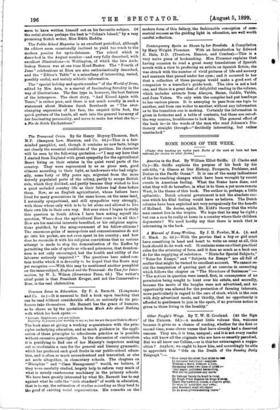The Transvaal Crisis. By Sir Henry Meysey-Thomson, Bart. M.P. (Sampson
Low, Marston, and Co. 6d.)—This is a fair- minded pamphlet, and, though it contains no new facts, brings out clearly the essential conditions of the problem. Its character will be seen by the following quotation :—" I may say here that I started from England with great sympathy for the agricultural Boers living on their estates in the quiet rural parts of the country. They were represented to us as pious men, good citizens according to their light, as landowners who had origin- ally, some forty or fifty years ago, migrated from the more densely populated parts of the colony, partly to escape British rule, which they disliked, and partly because they wished to live a quiet secluded country life as their fathers had done before them. Now, as an English agriculturist, whose fathers have lived for many generations in the same house, on the same land, I naturally sympathised, and still sympathise very strongly, with those whose only wish is to be let alone and allowed to live their own life in their own way. But ever since I began to study this question in South Africa I have been asking myself the question, Where does the agricultural Boer come in in all this ? How are his material interests benefited, or his religious aspira- tions gratified, by the misgovernment of his fellow-citizens ? The enormous gains of monopolists and concessionnaires do not go into his pocket, are not even spent in his country ; and how does he reconcile it with his religious convictions that no serious attempt is made to stop the demoralisation of the Kaffirs by permitting the sale of spirits so vile and poisonous, that drunken- ness is not only encouraged, but the health and utility of the labourer seriously impaired ? " The questions here asked con- tain truths which it is devoutly to be hoped that the Boers may yet recognise.—With this may be mentioned another pamphlet on the same subject, England and the Transvaal : the Case for Inter- vention, by W. L. Wilson (Grosvenor Press, 61) The writer's chief point is that President Kruger, and not the Conservative Boer, is the real obstructive.


































 Previous page
Previous page